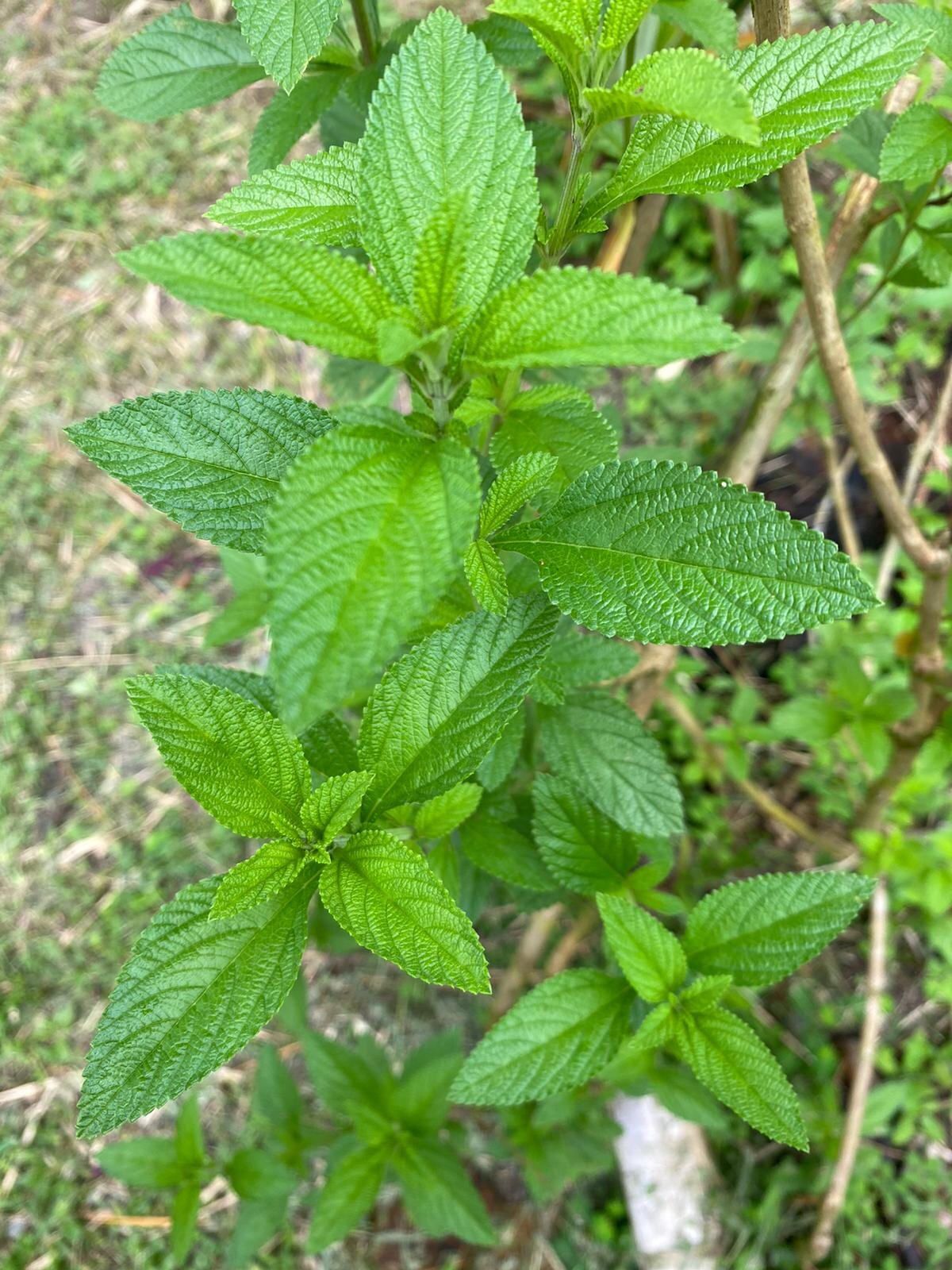Jungle Apothecary: Lemon Balm and Holy Basil
By 2021 apprentice Dewey
“It’s balancing, it’s a panacea, a good nervine. Good for the heart, for the soul, for babies, for the elderly, and everyone in between.”
Medicinal Herbs
A selection of dried herbs for tea making
An effective way to begin to more easily incorporate herbs into your life is by making herbal teas. For many, herbal tea is a ritual. Others, however, may just enjoy the warmth and taste of a freshly brewed cup following a meal. Some use tea as a way to prevent and heal disease, while others think it is a tasty and refreshing way to begin their day. Regardless of what role tea has (or has not) played in your life, when we begin to look more reverently into the cup, we can start to understand the deeper workings of the leaves within.
If you have been fortunate enough to have visited Rancho on-site, chances are you were able to take a peek at the incredible tea station we have set up at the main house. Herbal teas are truly an invaluable resource out here in the jungle. They help keep us well... and we mean that in every sense of the word—mentally, physically, emotionally, spiritually. Two of the most loved here at Rancho are Lemon Balm and Holy Basil (also known as Tulsi).
Cup of tea anyone?
When beginning to look at herbs and the impressive impact they can have on our being, it is common for many to see and approach herbs in the same context we tend to approach pharmaceuticals. This makes sense, as we often have the ability to use them to replace or supplement the pharmaceutical industry’s role in our healing journey. However, if you are able to start to restructure your thoughts around this concept, you might be begin to reach into an entirely new depth of herbs. In many other systems of healing around the world, a variety of herbs are used mildly and habitually to ensure a lifetime of health and longevity.
The usage and recommendations of herbs in this blog are intended to inspire deeper love and further independent research into the role herbs can play in your own individual journey. It is important to note that we are all unique. In the same way that everyone can have different reactions to foods, allergens, medications, etc., herbs can and will have different impacts on different people. Something that might work wonders for me, might have a completely different impact on someone else.
Many herbal teas are safe for all to consume in moderation, but it is important to pay attention to your body. If you introduce a new herb or plant into your life and you notice any negative side effects, listen to what your body is telling you and stop consuming it. Make sure to do your own thorough research and check with your local herbalist, naturopath, or doctor about any long term or high volume consumption of an herb to ensure safe use.
LEMON BALM
Lemon balm, with its sweet-lemony aroma and delicious taste, is an incredible plant to have and grow in your medicinal garden. This member of the mint family is relatively easy to grow and can even thrive in containers if you are without your own land or space to cultivate herbs. Although it is hard to put it’s far reaching abilities and potential into a box, lemon balm is typically classified as a nervine. Nervines are herbs that soothe, relax, and support the nervous system. Interestingly, it’s high volatile oil concentration, most significantly of citronellal and citral, has been proven in modern studies to confirm the plant’s ability to calm both the digestive and the nervous systems.
The versatility of this herb cannot be understated. Lemon balm is incredibly calming and is used to mitigate feelings of stress, anxiety, and nervousness. It is also used as an antiviral to ward off a variety of viral infections (even ones as aggressive as the herpes simplex), as well as anxiety, stress, fevers, coughs, and so much more. For example, the plant can be used topically as a powerful agent in your herbal first aid kit for insect bites and stings, but also used internally as a powerful relaxant. Due to its high antioxidant levels, studies have shown that lemon balm is even capable of markedly improving oxidative stress levels and plasma DNA damage.
Lemon balm is a very safe herb to incorporate into you and your loved ones lives. Cascade Geller, an herbalist and activist is quoted as saying, “It’s balancing, it’s a panacea, a good nervine. Good for the heart, for the soul, for babies, for the elderly, and everyone in between” in regards to lemon balm. Here at Rancho we love brewing a nice cup of lemon balm to help us relax after a busy day of working hard. To make a simple, nourishing cup of lemon balm tea, use one teaspoon of fresh or dried leaves per cup of hot water. To make a stronger brew this amount can be increased to desired taste up to one ounce of leaves.
HOLY BASIL (TULSI)
Holy basil has a loooong history. It has been used in India for over 3,000 years! It is used widely and often around the world. Ayurveda (one of the oldest systems of medicine) reveres holy basil as a powerful tool for optimal health. When seeking to utilize the health benefits of this powerful herb, it is important to make sure you are working with the correct species. Holy basil is not the same species as the common culinary plant we are all familiar with. Out of the (over) 60 different species of Ocimum genus, there are three that are considered Holy Basil and can be used somewhat interchangeably: Rama tulsi, Krishna tulsi, and Vana tulsi.
Holy Basil is one of many powerful adaptogens that have been identified to help reverse chronic damage and bolster overall health. Adaptogens are a classification of herbs that are building and nourishing. When used consistently, they help the body adapt to stress and move it toward overall wellness. David Winston and Steve Maimes are co-authors of an incredible book on adaptogens, and speak highly of holy basil, “Holy basil is classified as a Ramayana, an herb that nourishes a person’s growth to perfect health and promotes long life.” The adaptogenic nature of holy basil can even aid in the mediation of stress related damage and subsequently improve the overall cardiovascular health of an individual.
Some major health benefits holy basil is also known for providing are: reducing stress and anxiety, supporting a healthy heart, and strengthening the immune system. When it comes to stress and anxiety, holy basil has also been shown to reduce peripheral symptoms such as forgetfulness and lethargy. Researchers have even proven it to act as an effective treatment of generalized anxiety disorder. Due to its ability to slightly thin our blood, it also promotes good circulation. In regards to overall health, holy basil modulates and supports our immune system. It is also an antimicrobial herb and therefore can be utilized in the treatment of bacterial, fungal, and viral infections.
Fresh holy basil is ideal, but the dried leaves can also be used to make a tea. Begin with about a teaspoon of leaves to each cup of hot water and increase from there to desired taste and potency. One thing to consider is the high volatile oil content of this herb- for ideal results to not steep covered for more than ten minutes.
Keep drinking your herbs! Keep eating your herbs! Keep learning your herbs!
Want to Learn More
Join us for one of our permaculture related workshops, including Plants as Medicine.
Sign up for our monthly blog updates if you want to keep learning with us!
Read some of our past food related blog articles!






